Brexit Brief Newsletter
December 2019

This edition of the Brexit Brief details the conclusions of the EU Council meeting in December 2019; the Government’s plans for Brexit related legislation as outlined in the Queen’s Speech; and the Government’s plans for a new 'Taskforce Europe’. We also have information on the EU (Withdrawal Agreement) Bill which will incorporate the UK-EU Withdrawal Agreement into domestic law and news of amendments to the legislation tabled by local political parties.
TRADE COMMISSIONER ON THE FUTURE TRADE DEAL
Speaking at an event for business leaders in Dublin on 6 December, new EU Commissioner for Trade Phil Hogan referred to the “seemingly endless question of Brexit”.
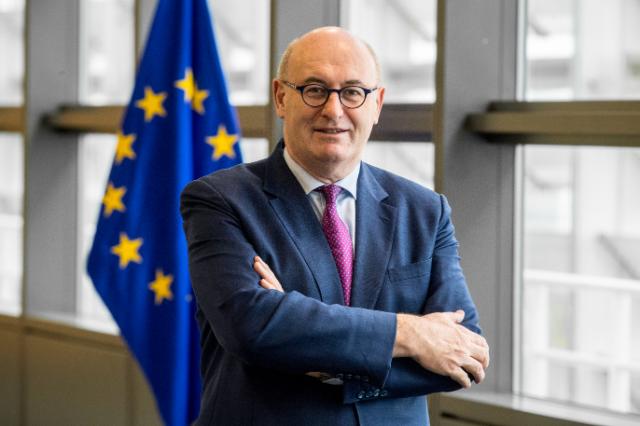
Photo: European Commission AV Service, Photographer: Mauro Bottaro
“….. There is the option to extend the transition period further, and I can assure you that the European Commission will be ready to negotiate with speed and precision. We have not been idle in our preparations, and we are not entering this negotiation from a zero start. The most productive thing the UK government could do at this point is to focus on content, not timing: stop speculating about timelines and focus on the nuts and bolts of a trade agreement with the EU.
We are still in the dark as to what type of FTA the UK will ultimately want. So the urgent priority for the next government must be to outline its preferences, and then carefully define its offensive and defensive interests for each stage of negotiations.
As with any trade deal, this is going to involve compromises and trade-offs, and the next government should consult widely with all stakeholders in business, civil society, politics and administration to help define negotiating priorities……”
“….. But there is a lot of work to be done before we can finalise an ambitious free trade agreement with the UK. Preserving the integrity of the single market remains our top priority. We have made it very clear that, because of our geographical proximity and our economic interdependence with the United Kingdom, any new trading arrangement will require firm and fair rules.
Prime Minister Johnson said he wanted a "best in class free trade agreement". From our side, as Michel Barnier has correctly pointed out, “best in class” means a trade agreement that is not just about economic and financial gains, with zero tariffs and zero quotas, but an agreement which is in the interest of our people, their environment, respect for their rights and for their quality of life.
We will therefore require solid guarantees of a level playing field in relation to state aid, labour and environmental protections, and taxation arrangements. The level of ambition of any future free trade agreement is entirely dependent on adequate protection of the EU single market, as we have made abundantly clear time and time again….”
IMPLEMENTATION OF THE IRELAND/NORTHERN IRELAND PROTOCOL
The Financial Times on 9 December reported on a document from the Department for Exiting the EU which was circulated in the previous week to senior officials in Whitehall which says:
“Delivery of the required infrastructure, associated systems, and staffing to implement the requirements of the [Ireland/Northern Ireland] protocol by December 2020 represents a major strategic, political and operational challenge.” It adds that “delivery on the ground would need to commence before we know the outcome of negotiations.”
The document, marked “Official Sensitive” and titled “Delivering the Protocol by December 2020”, concludes by discussing the possibility that the government would not be ready to put in place new systems and procedures to cover trade with Northern Ireland by the end of next year.
Speaking on Sky on the ‘Sophie Ridge on Sunday’ programme on 8 December, Prime Minister Johnson said:
“There’s no question of there being checks on goods going NI/GB or GB/NI …… We’re part of the same customs territory and it’s very clear that there should be unfettered access between Northern Ireland and the rest of GB.”
EUROPEAN COUNCIL MEETING
The European Council met in Article 50 format on 13 December 2019 to discuss Brexit and the future EU-UK relationship. The Council agreed to reappoint Michel Barnier as the chief negotiator on the future relationship.
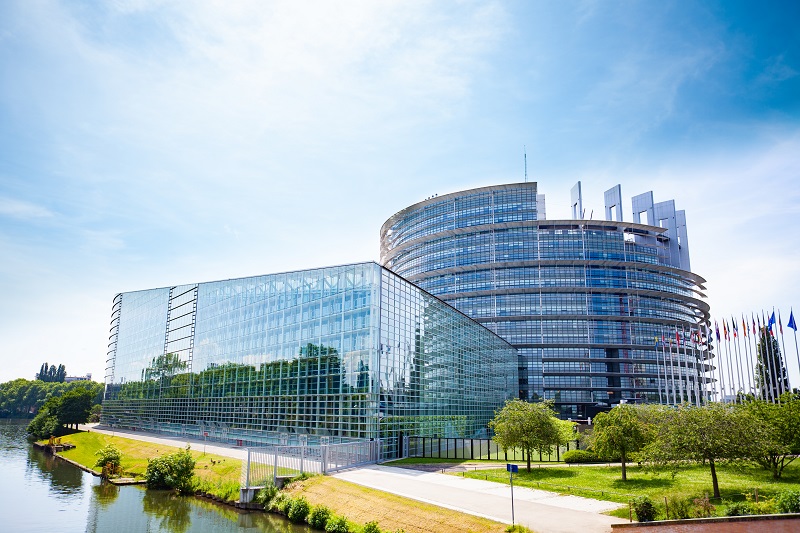
“EU27 leaders discussed Brexit and preparations for the negotiations on future EU-UK relations after the withdrawal. They called for a timely ratification and effective implementation of the withdrawal agreement. They also reconfirmed their aim of establishing as close as possible a future relationshipwith the UK.
"The future relationship will have to be based on a balance of rights and obligations and ensure a level playing field."
The European Council invited the Commission to submit to the Council a draft comprehensive mandate for a future relationship with the UK immediately after its departure. EU leaders also invited the General Affairs Council to adopt swiftly the relevant decisions and negotiating mandate.
EU27 leaders welcomed the Commission’s decision to reappoint Michel Barnier. The negotiations on the future relationship will continue to take place in a coherent manner and in unity and transparency with all member states. They will be run in coordination and permanent dialogue with the Council and its preparatory bodies.”
Speaking on the 13 December when the results of the general election were known, President of the European Council Charles Michel said:
“We expect as soon as possible a vote by the British parliament on the withdrawal agreement. It is important to have the clarity as soon as possible. We are ready. The EU will negotiate to ensure to have a close cooperation in the future with the UK.”
President of the European Commission, Ursula von der Leyen said:
“The time frame ahead of us is very challenging. We will have to work as soon as possible. We will be ready to get the most out of the short period available……
… We want our future relationship to be as close as possible in full respect of our principles. The United Kingdom, yes, will become a third country, but at the very end, we will have an unprecedented partnership. This is not the end of something. This is the beginning of excellent future relations between good neighbours.”
On the future negotiations on a trade deal with the UK, Vice-President of European Commission Valdis Dombrovskis tweeted:
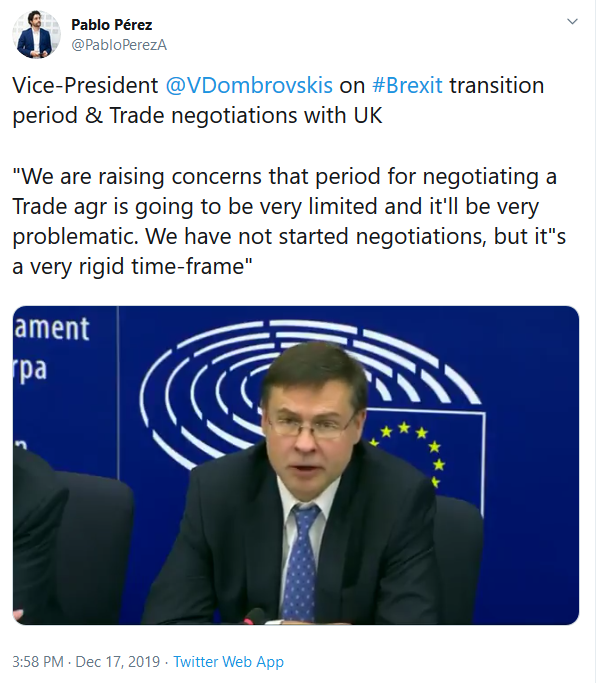
QUEEN’S SPEECH – BREXIT LEGISLATION
The Queen’s Speech marking the state opening of the new parliament was held on 19 December 2019. Commenting on the Government’s plans relating to the UK exit from the EU, the Queen said;
“My Government’s priority is to deliver the United Kingdom’s departure from the European Union on 31 January. My Ministers will bring forward legislation to ensure the United Kingdom’s exit on that date and to make the most of the opportunities that this brings for all the people of the United Kingdom.
Thereafter, my Ministers will seek a future relationship with the European Union based on a free trade agreement that benefits the whole of the United Kingdom. They will also begin trade negotiations with other leading global economies…..”
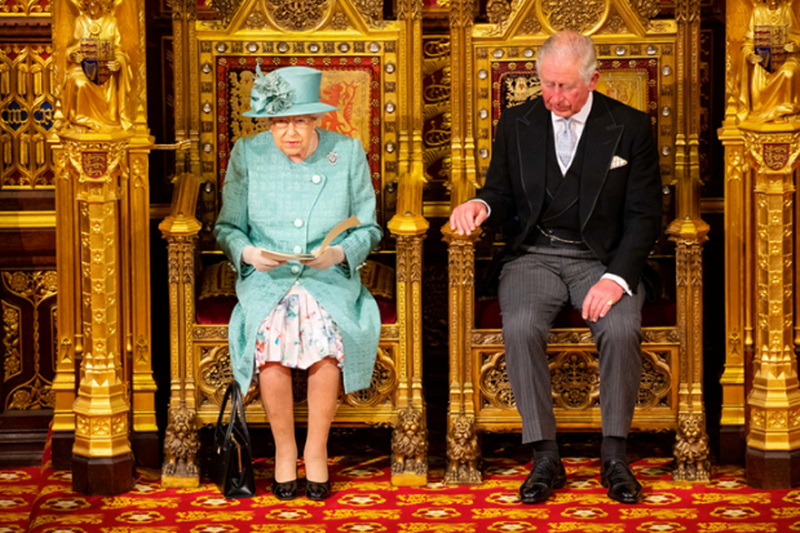
Source: Queen's Speech December 2019 (OGL)
The Government will introduce an number of pieces of legislation relating to exit from the EU. It states that this will include:
- “EU (Withdrawal Agreement) Bill
- The European Union (Withdrawal Agreement) Bill will ratify the deal secured by the Government in October, delivering Brexit.
- Agriculture Bill
- The Agriculture Bill will reform UK agriculture by improving environmental protections and strengthening transparency and fairness in the supply chain.
- Fisheries Bill
- The Fisheries Bill will enable us to reclaim control over our waters, ensuring the sustainability of our marine life and environment.
- Trade Bill
- The Trade Bill will establish the Trade Remedies Authority to protect UK industry from unfair trading practices.
- Immigration and Social Security Co-ordination (EU Withdrawal) Bill
- We will end free movement and pave the way for a modern, fairer points-based immigration system.
- Financial services legislation
- We will provide certainty, stability and new opportunities for the financial services sector.
- Private International Law (Implementation of Agreements) Bill
- A Private International Law (Implementation of Agreements) Bill will provide a clear framework for cross-border resolutions for individuals, families and UK businesses involved in international legal disputes."
DEPARTMENT FOR EXITING THE EU TO BE WOUND UP
The Government confirmed on 19 December that the Department for Exiting the EU (DExEU), led by Brexit Secretary Stephen Barclay, will be wound up after 31 January 2020.
A statement from No 10 said:
"The Department for Exiting the European Union will be wound up once the UK leaves the EU on the 31 January.
"DExEU staff have been spoken to today. We are very grateful for all their work and we will help everyone to find new roles."
It has been reported that a new ‘Taskforce Europe’ will be established to work on implementation of the Withdrawal Agreement and lead on the future UK-EU relationship negotiations. The unit will be headed by David Frost (the Prime Minister’s Europe Adviser) with the team being run by Cabinet Office with personal oversight from the Prime Minister.
It has also been reported that Prime Minister Johnson has ordered officials to cease using the term ‘Brexit’ after 31 January. The Downing Street Brexit press team will be renamed, possibly to ‘Europe and Economy’.
EU (WITHDRAWAL AGREEMENT) BILL
The Government introduced the European Union (Withdrawal Agreement) Bill into the House of Commons on 19 December. This Bill incorporates the revised Withdrawal Agreement into domestic legislation, enabling the UK to leave the EU on 31 January 2020.
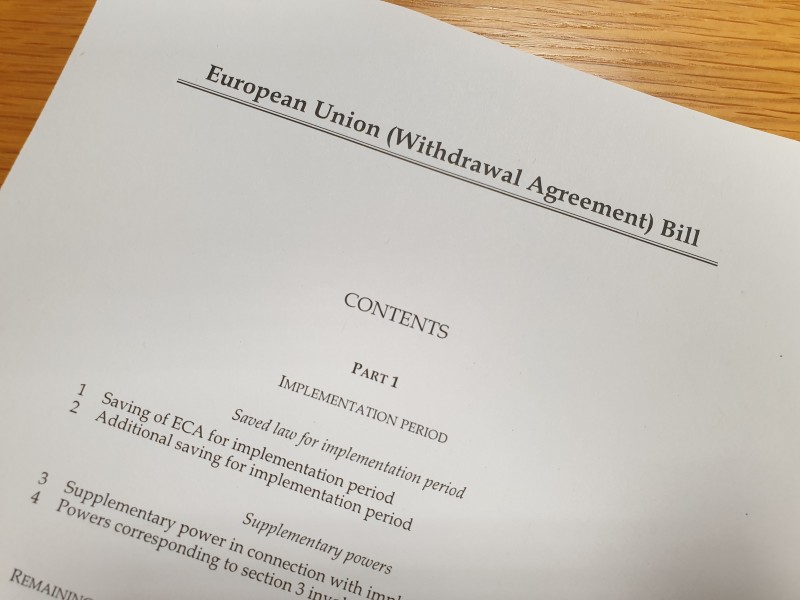
MPs approved the Second Reading of the Bill on 20 December by 358 to 234 votes. The Bill proceeded to a Committee of the whole House on Tuesday 6 and Wednesday 7 January, and its Third Reading will be on Thursday 8 January 2020. On 13 January, the Bill will then move to the House of Lords for consideration and is expected to be on the statute book within 7-10 days.
The content of the EU (Withdrawal Agreement) Bill is similar to the Bill introduced by Government in October 2019 which fell when Parliament was dissolved. Three clauses and one Schedule have been removed, and five new clauses have been added. A tracked changes version of the Bill to illustrate how the current Bill differs from that introduced in October 2019 is available here.
Key changes include:
- removing MPs' approval role in relation to the Government’s negotiating mandate and removing enhanced Parliamentary approval process for any future relationship treaty subsequently negotiated with the EU
- removing additional procedural protections for workers’ rights
- prohibiting any UK Minister from agreeing to an extension of the transition or implementation period
- removing the Government’s existing obligations to unaccompanied children seeking asylum in the EU who have family members in the UK
A number of amendments have been tabled to the Bill and those selected by the (temporary) Chair of the Committee of Ways and Means, Sir Roger Gale, will be debated.
SCOTTISH & WELSH OPPOSITION TO EU (WITHDRAWAL AGREEMENT) BILL
Speaking at his first press conference of 2020 on 6 January, First Minister of Wales Mark Drakeford said his government "will not give up advocating for a form of Brexit that is protective of Welsh interests" and "we cannot recommend that the National Assembly for Wales gives approval to the UK government's bill [EU (Withdrawal Agreement) Bill]."
The Scottish Government wrote to the Scottish Parliament on 20 December recommending that the Scottish Parliament does not give legislative consent to the European Union (Withdrawal Agreement) Bill stating:
“ [EU] withdrawal will be forced on Scotland, with the increased threat of no-deal remaining at the end of 2020, means that the Scottish Government cannot support this deeply damaging course of action…”
BUSINESS GROUPS SECURE CROSS PARTY AGREEMENT ON AMENDMENTS TO WITHDRAWAL AGREEMENT BILL
On 6 January 2020, a group of Northern Ireland business and trade bodies held a meeting with a cross party delegation of politicians on potential amendments to the EU (Withdrawal Agreement) Bill. The group included:
- CBI (Northern Ireland)
- Dairy Council for Northern Ireland
- Federation of Small Businesses (Northern Ireland)
- Freight Transport Association
- Institute of Directors (Northern Ireland)
- Mineral Products Association of Northern Ireland (MPANI)
- Northern Ireland Chamber
- Northern Ireland Food and Drink Association (NIFDA)
- Northern Ireland Meat Exporters’ Association (NIMEA)
- Northern Ireland Retail Consortium
- Trade NI
- Ulster Farmers’ Union
The group secured the agreement of politicians to seek amendments which would ensure parity of access to the GB market for Northern Ireland businesses; protections for consumers and companies from the costs of new trade frictions; and that the Northern Ireland Executive would be consulted by the Government on any regulations which could impact Northern Ireland’s place within the UK internal market. The political delegation included DUP, Sinn Féin, UUP, SDLP and Alliance representatives. A joint statement issued by the group following the meeting said:
"Businesses are the lifeblood of our economy and they must be allowed to operate without undue hinderance to ensure they can continue to serve the region, create jobs and support our families.
That is why we have come together to seek changes to the EU (Withdrawal Agreement) Bill that we believe will protect Northern Ireland's place in the UK internal market and provide the guarantee of equitable and unfettered access to the Great Britain market for both exporters and importers. These changes do not seek to undo the will of Parliament in leaving the EU, merely to protect our economy and our households.
We of course recognise that there are great challenges ahead and lots of work still to be done. A collective effort is now required to inform the crucial political decisions that are yet to be made.
The commitments that have been made across the political divide to seek amendments to the EU Bill are unprecedented and we now urge politicians and others with influence to do all in their power to help Northern Ireland continue to fluorish after Brexit and long into the future. At last, all the parties are in tune with business and are speaking up for the whole of Northern Ireland"
EUROPEAN COMMISSION MEETING WITH PRIME MINISTER
On 8 January, European Commission President Ursula von der Leyen and head of the UK Taskforce Michel Barnier visited London to meet with Prime Minister Johnson to discuss the UK’s withdrawal from the EU. Ms von der Leyen also gave a speech at the London School of Economics entitled ‘Old Friends, New Beginnings’
WHAT'S NEXT?

Jan 29 2020: European Parliament expected to vote on ratification of the Withdrawal Agreement
Jan 31 2020: The final date in law by which the UK is scheduled to exit the EU
Feb 25 2020: European Council adoption of ‘headline principles’ of EU negotiating position
April 4 2020: Announcement of results of Labour leadership contest
July 1 2020: The date in the Withdrawal Agreement by which the UK and EU must decide if they want to extend the transition period beyond the current deadline of December 2020.
Dec 10-11 2020: European Council
Dec 31 2020: Date in law when the transition period ends



